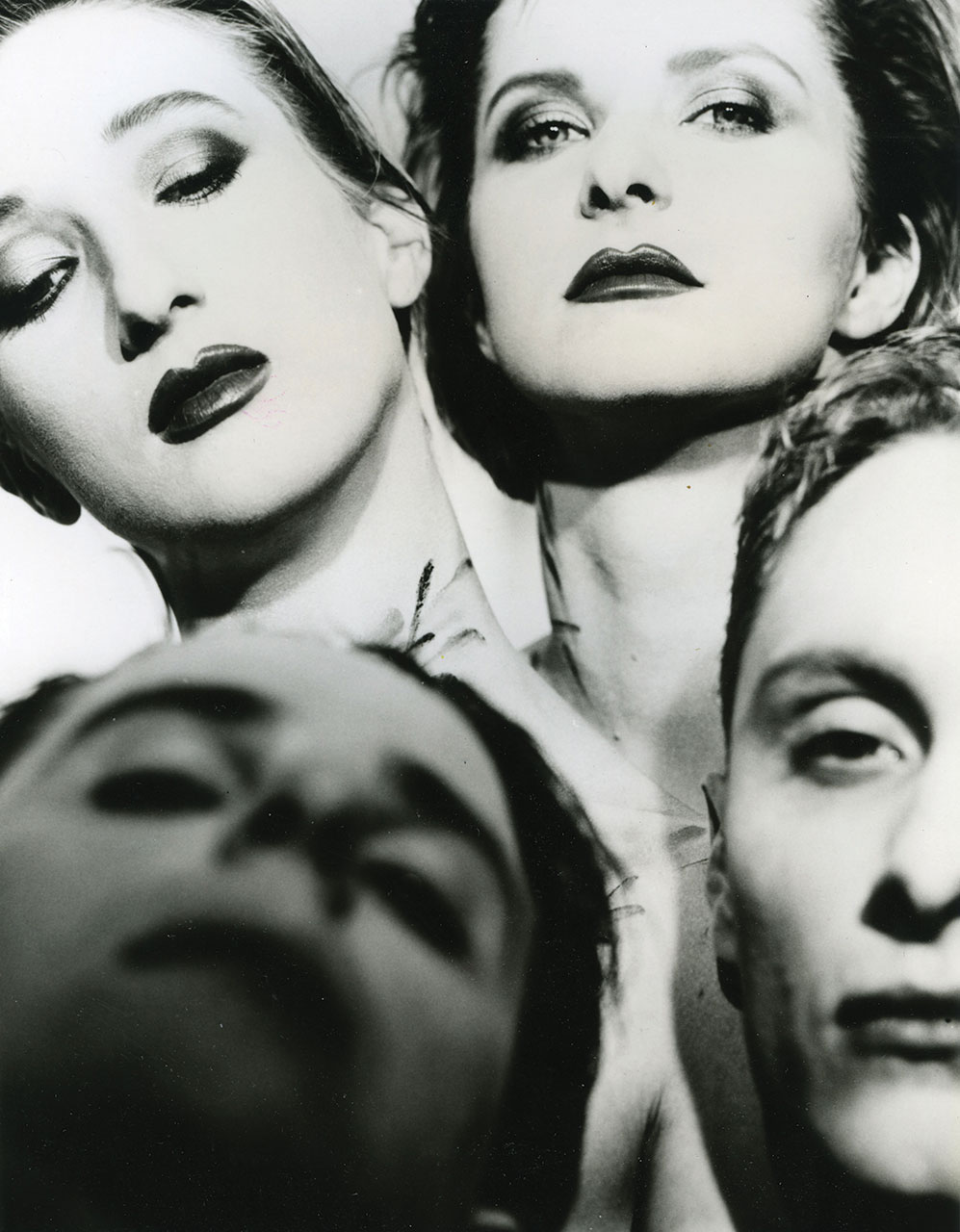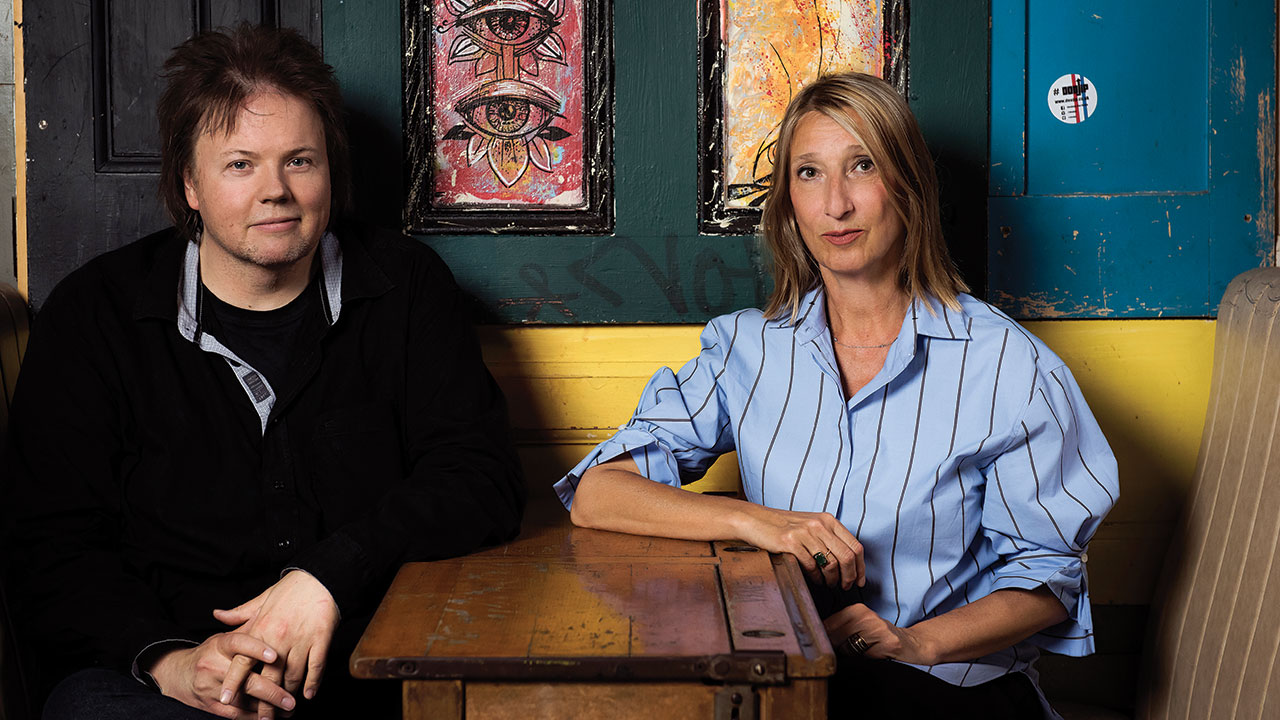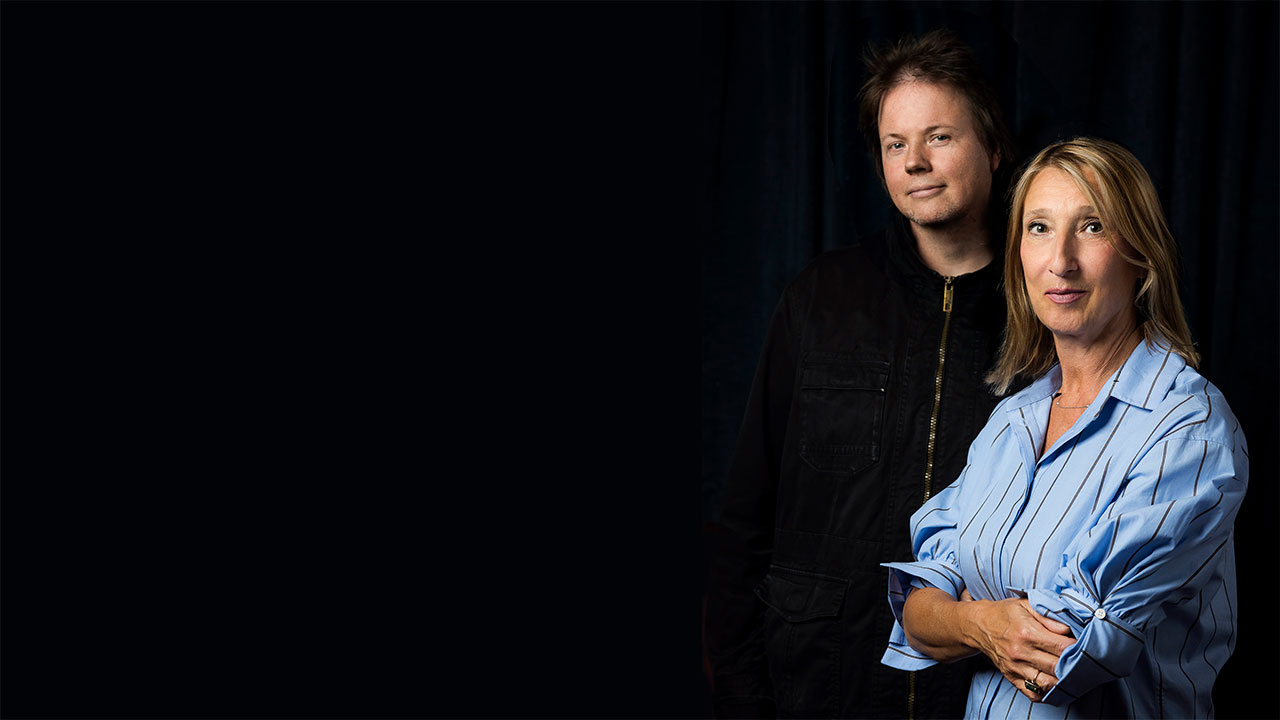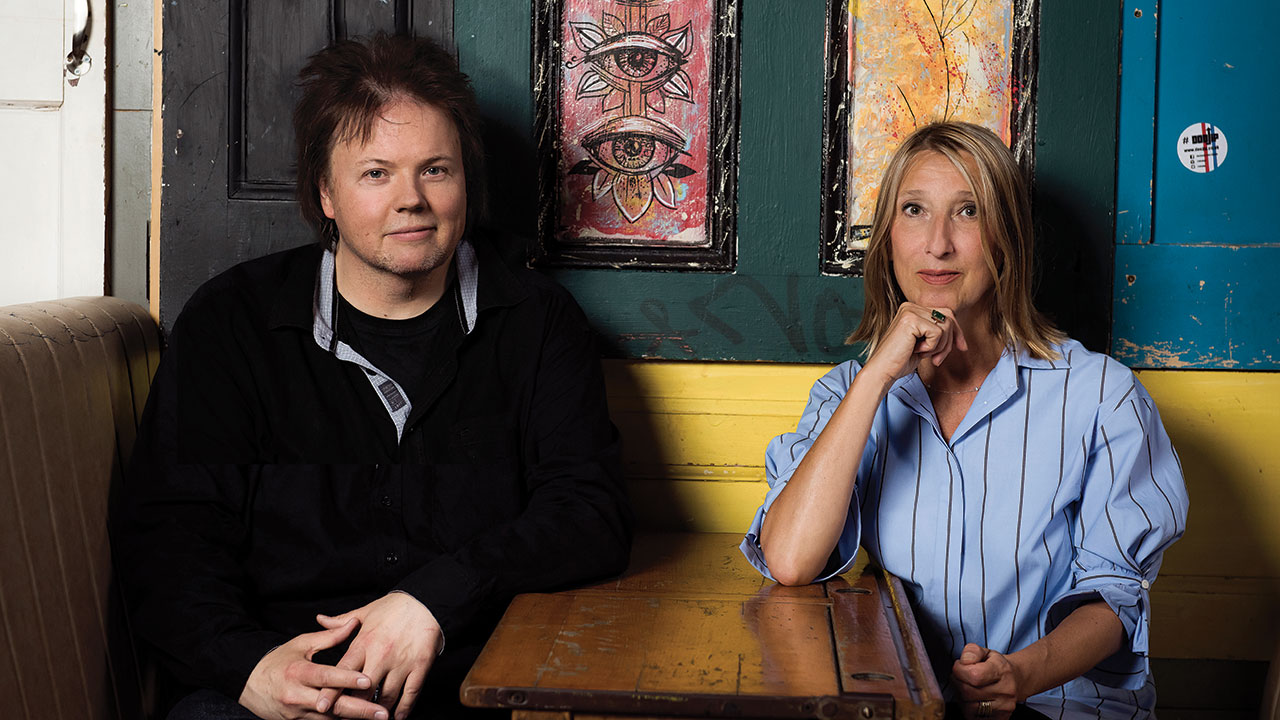Claudia Brücken was in her teens when she first heard Tangerine Dream. Growing up in Germany in the 70s, they were hard to avoid – not so much a mainstream presence as part of the musical fabric at a time when the country was leading the way in forward-looking experimental music.
“When you were exploring new electronic music, Tangerine Dream were just there,” says Brücken, who, as a former member of early-80s art pop group Propaganda, knows a thing or two about the subject. “They were part of this whole wave of artists who were creating new sounds, which was really exciting to be in the middle of.”
Next to her, Jerome Froese smiles. He’s the son of visionary Tangerine Dream founder Edgar Froese, and he was a member of that band between 1990 and 2006. “It was hard for me to measure their importance back then because I was around them since I was a young child,” he says. “But I know how much my father and his music were respected.”
The two of them are sitting attentively at a table in the restaurant of an unassuming Central London hotel. Froese arrived from his home in Berlin yesterday, landing in the middle of one of the most ferocious thunderstorms of recent memory.
“We circled around for about an hour,” he says, pulling up a photo on his phone of a biblical deluge taken from the plane’s window. “We didn’t even know if we could land.”
Brücken has made the short journey from her flat in north London. She has called the capital home since moving here in the early 80s, when Propaganda became the first band to sign to Buggles/Yes producer Trevor Horn’s record label/art pop collective, ZTT.
The pair have united for a new collaborative album, Beginn, which marries Froese’s exploratory music to Brücken’s emotive voice. The German-language title is just a consonant away from its British equivalent, though the meaning is clear anyway. “This is the start of it,” says Brücken of their musical union. “It’s our beginning.”
Aptly enough given their respective pedigrees, Brücken and Froese met electronically before they came together in the flesh. In 2014, he was looking for someone to sing on some new songs he was writing. A mutual friend suggested Brücken, whom Froese knew of via her work with Propaganda, as well as her latter-day solo career.
“I discovered [Propaganda’s landmark 1985 debut album] A Secret Wish when I was a teenager,” he says. “It’s not a question of whether you know it or not – if Trevor Horn is involved and you’re a musician, you have to know it.”
The two of them spoke via Skype – “For two and a half hours,” says Froese – and they found out they had more in common than just a shared nationality and an involvement in music that pushes at the boundaries.
“We told each other our horror stories about business, about what happened,” says Brücken. “And we were both like, ‘You’re not telling me anything new.’”

On paper, the pair are a slightly odd match. Froese is the baby-faced son of German prog royalty, Brücken is the elegant art student turned synth-pop star. But the parallels between them aren’t hard to draw, not least the fact that they both started out in music when they were in their teens.
Brücken grew up in Düsseldorf, the industrial city located on the Rhine in the north-west of Germany. Kraftwerk and Neu! had emerged from the city’s experimental underground a few years earlier, and Brücken threw herself into the local music and art scene.
“We didn’t have computers or iPhones, and for us, making music was our way to communicate,” she says. “It’s what we would do on a Saturday. We’d go in a rehearsal room and make music, make sounds, create. That was our way of entertaining ourselves.”
Brücken was in her last year of school when she was invited to join Propaganda. The band were already negotiating a deal with the newly launched ZTT when she came on board. Their first two singles – the icy, industrial-tinged Dr Mabuse and the classy synth-pop of Duel – were both hits at home and in the UK.
“We were quite arty and experimental, but we had been given this chance to work with Trevor, so we were being treated like, I don’t know… Seal!” she says with a laugh. “I remember at the time, all the artists and musicians in Düsseldorf couldn’t believe it – everyone wanted to work with Trevor Horn. A lot of people were like, ‘Why them and not us?’”
Despite Horn’s association with Yes, ZTT was geared towards cutting-edge pop rather than prog rock. But it was infused with the same forward-looking spirit, as well as an electrifying sense of community: the studio was a magnet for passing musicians, including Propaganda’s early labelmates Frankie Goes To Hollywood and Art Of Noise.
“There was definitely a progressive spirit to it,” Brücken says. “It was just this explosion of creativity. You’d run into the different studios and they would be full of musicians using the latest gear that Trevor had bought. Paul Morley [journalist and ZTT propaganda minister, and Brücken’s ex-husband] was from Manchester and he knew the people who had set up Factory Records. They shared an ideology.”
This air of controlled chaos was what drew Steve Howe into Propaganda’s orbit. He played a solo on The Murder Of Love, a track on the German band’s debut album, A Secret Wish.
“It was exactly that – controlled chaos,” says Brücken. “[Producer] Stephen Lipson had no idea what to do in that section of the song. He said, ‘It needs some jazzy solo.’ He walked out of the studio and there was Steve Howe. He was working with Trevor on something. Stephen said, ‘Do you fancy popping in and doing a bit of noodling?’ And he said, ‘Sure.’ You couldn’t have planned it.”
When Propaganda became embroiled in contractual and legal issues with ZTT in 1986, Brücken left the band. Her subsequent career saw various collaborations and solo projects, though her most recent album, 2014’s Where Else… found her blending electronics with washes of evocative guitar. The cover even featured her with an instrument slung over her shoulder like a classic rock troubadour.

“It was super different for me and I really liked making it, but I was very happy when Jerome contacted me,” she says. “I wanted to make electronic music again.”
The ironic thing is that Jerome Froese isn’t an electronic musician. Or at least, he isn’t just an electronic musician. He writes mostly on the guitar, then proceeds to feed it through all manner off effects pedals and computer software. He calls the results ‘Guitartronica’.
“Most guitar players only play in a rock’n’roll way,” he says. “My intention was to let the guitar sound like a keyboard, like a sequencer. There are so many sounds and so many possibilities to explore. I did many guitars on this album as well, but mainly they don’t sound like a guitar.”
Froese literally grew up in a creatively fertile environment. He was born in 1970, the same year his father’s band released their debut album, Electronic Meditation. At two, he appeared on the cover of Tangerine Dream’s Atem album. He was always destined to join the family business, though he resisted until he was 19.
He had been writing and playing music on the keyboards and computers his father would cast off every time he got new equipment. Then, in 1990, Tangerine Dream were booked to play a gig in the former East Berlin to mark the fall of the Berlin Wall the previous year.
“I said to Edgar, ‘Hey, the highlight of every concert is your guitar solo – how about I join you for that? I walk onstage, play the guitar solo, walk off, end.’ And he said, ‘Yeah, let’s do that.’ Then he came back and said, ‘There’s a slight change – you play the guitar solo, but you’re onstage the whole time.’ And then I was in the band.”
Jerome remained a member of the group for the next 16 years. He says it was “a special affair” working with his father. But around the turn of the millennium, his mother died and things began to change.
“My father got into another relationship and married again,” he says. “My mother always kept Edgar grounded – she was the leveller. My stepmother was a whole other way: ‘Hey, you are so good.’ My father’s character changed. It was difficult to work with him because my stepmother was also trying to move the band in several directions. I thought, ‘That’s not my thing.’ So I told Edgar, ‘I think we have to part ways.’ But it was not a decision he wanted. He always wanted to keep the family business intact.”
Froese began juggling new projects – his solo work; a record label, Moonpop; the electronic band Loom, formed with fellow ex-TD refugee Johannes Schmoelling; and now the album he’s made with Claudia Brücken. This latest collaboration started out with a song they worked on together for Loom.
“We did that one song together, which hasn’t actually been released yet,” says Brücken. “And Jerome had this idea: ‘Let’s do more together.’”

The new union was temporarily put on hold in early 2015 when Edgar Froese died. But the two reconvened later that year, with Brücken flying to Berlin so the two could begin work in earnest. Given their respective CVs, it wouldn’t have been a surprise if Beginn sounded like Propaganda meeting Tangerine Dream in an Apple shop. But that was something both were keen to avoid.
“I’m aware that people will go, ‘Well, why doesn’t it sound like Propaganda? Why doesn’t it sound like Tangerine Dream?’” says Brücken, trying and failing not to roll her eyes. “But we wanted to make music that didn’t sound like what we’d done before.”
Refusing to explicitly trade on their past bands’ achievements is a brave move. Brücken acknowledges that her days of pop stardom are a thing of the past – “Everything apart from Top 40 music is niche now” – but what she’s lost in fame, she’s gained in other things.
“Instead of starting small and growing bigger, I’ve had the opposite path,” she says. “For the first Propaganda album, we had an absurd budget. But working with Jerome is different – it’s liberating. In the past, I’ve always been aware that people will go, ‘Well, why doesn’t it sound like Propaganda?’ But with this one, it was, ‘Let’s just make some music and be free about it.’”
The pair say they intend to work together again on a follow-up album: “It will be called End,” Froese laughs.
There are no plans for gigs, though that’s more a case of waiting for the right offer than a lack of desire to recreate the new songs live.
“We didn’t have to satisfy anyone with this album,” says Froese. “We did it for ourselves. Not everyone is in that position, despite what they say. And it’s a great position to be in.”
This article originally appeared in issue 89 of Prog Magazine.

